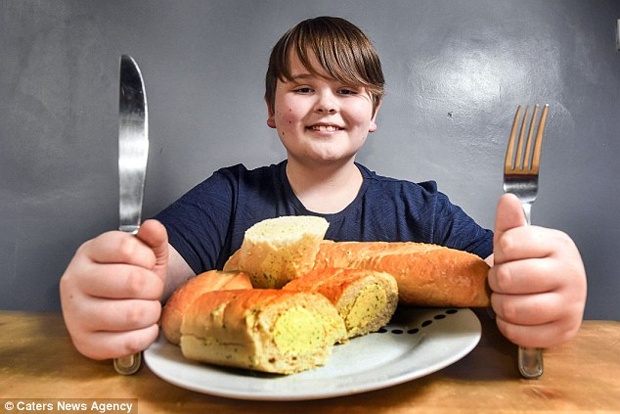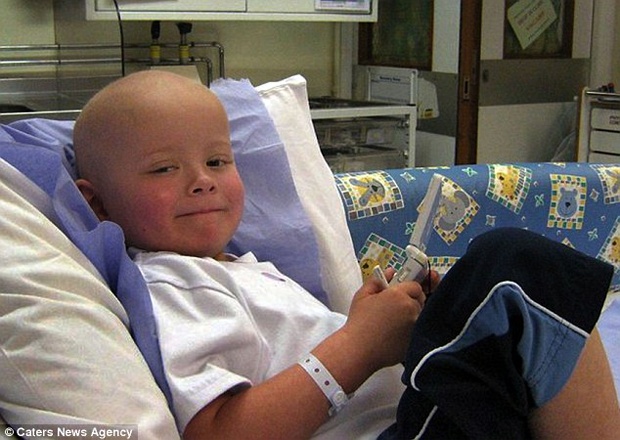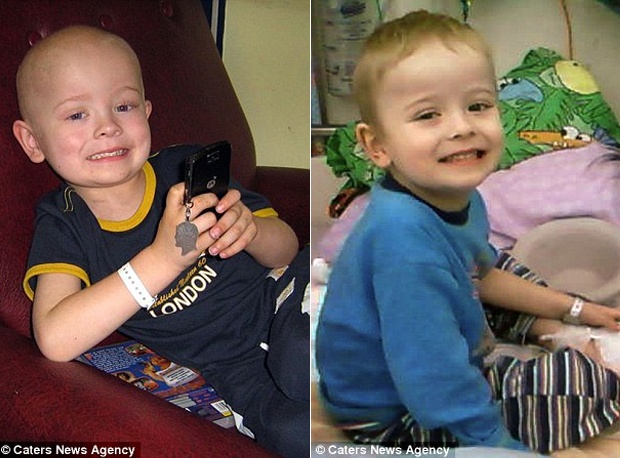Schoolboy who beat cancer has eaten nothing but GARLIC BREAD for 8 years
A schoolboy who survived cancer has been left with a bizarre side effect - he will only eat garlic bread. Billy Turner, 11, became addicted to the snack after chemotherapy to treat his Hodgkin’s Lymphoma left him unable to stomach anything else.
But, eight years after successfully beating the disease, he still refuses to eat anything else.
Now, his desperate mother Louise Blackshaw, 32, has turned to a hypnotist to try to help her son overcome his addiction.
Cancer charities say many patients experience eating problems during or after chemotherapy as it can affect cells in the throat making it painful to chew or swallow.
It is believed Billy's eating disorder was triggered by his treatment and has continued for years afterwards.

Ms Blackshaw said: 'When Billy was having his chemo, he said eating felt very strange, as the feeling of food moving down his throat felt very pronounced.
'The only thing that he said didn’t make him feel funny was garlic bread - so that’s what he ate. I was just happy he could eat something.
'But it’s now eight years later and he still refuses to eat anything else.'
Billy, from Greater Manchester, was diagnosed with cancer when he was just three years old - and underwent a six month course of chemotherapy in 2008.
During this time he complained about most foods and was only able to eat garlic bread.
Billy went into remission a year later, but despite only returning to the doctor for yearly check ups, his taste for the onion-infused loaf has remained strong.
Billy said: 'I want to be able to go to a restaurant now and actually order food like everyone else.
'I could always feel the food moving down my throat when I tried to eat and that was really off-putting - but I could always eat the likes of garlic bread.
'Only being able to eat certain food makes me feel really self-conscious and I always try to make sure that my friends don’t find out.'
John Newlands, Macmillan’s senior cancer nurse specialist said half to three quarters of people undergoing chemotherapy have changes to their taste and appetite.
.Chemotherapy destroys cells that divide quickly, such as those lining of the mouth and the tastebuds,' he said.
'Your tastes are affected by the drugs you received.
'The taste of foods are dulled or you get a metallic taste.

'Chemotherapy drugs are secreted into the saliva- so many patients would say they get a bad taste straight away.'
'This usually settles down a few weeks or months after treatment.'
He added that there is another phenomena known as anticipatory nausea and vomiting, in which people begin feeling sick at the sight of something that related to their chemotherapy.
He said: 'A person I know met her oncologist in Marks and Spencers years after treatment and when she saw him vomited all over him.
'And that’s because seeing him reminded her of the nausea of chemotherapy.'
He continued: 'That’s not a physiological thing, it’s a psychological problem.
'It can be the same with food; during chemotherapy people eat food and it makes them feel sick and the brain remembers that association.
'So when they eat it again after treatment that feeling of nausea is stimulated.'
He said this might be what is happening in Billy's case.
'There is something in swallowing food that triggers the unpleasant feeling it will stick in his throat,' he said.
'The remedy for that would lie with a clinical psychologist. They could help unlock those feelings.'
Ms Blackshaw has now enlisted the help of hypnotherapist Felix Economakis, who specialises in helping people overcome Selective Eating Disorder.
In 2014 he helped cure a 20 year-old woman, Hannah Little, from Cornwall, who ate chips every day since she was five years old - after she developed a fear of all other foods which made her physically sick if she tried to eat them.
After just one session she reported a substantial difference

Now, Mrs Blackshaw is hoping for a similar result. She said: 'Billy’s eating habits began to change after he was diagnosed with cancer and he complained about how the food felt as he ate it.
'Although I wanted to cook meals for all of the family, there was nothing that he could eat and he ended up with a really restricted diet.
'It always upset me to see the lengths that Billy had to go to, to find something that he would be able to eat.
'At the time when Billy was first going through chemo, it was easier that he ate what he was comfortable with, but he fell into the same pattern.
Billy said he kept feeling like his food was getting stuck in his throat whenever he tried to eat something that was new or unknown to him.
'All the doctors we visited just said that Billy was a fussy eater, but didn’t know what else to say.
'Billy has started his hypnotherapy now and we’re really hopeful that it will work. He’s already beaten cancer, he can beat this too.'
Mr Economakis, a psychologist and clinical hypnotist for The Heath therapy clinic, said: 'SED as a phobia is confused with a natural phase in childhood which is fussy eating.
'While a lot of people act as if they are just fussy, people with SED would rather die than eat certain foods.
'Typically it’s because they had a traumatic childhood experience which resulted in them mistrusting food.
'Some people will be able to get food near their mouth or even in it, but the food will not go down and the body refuses to swallow it.'



